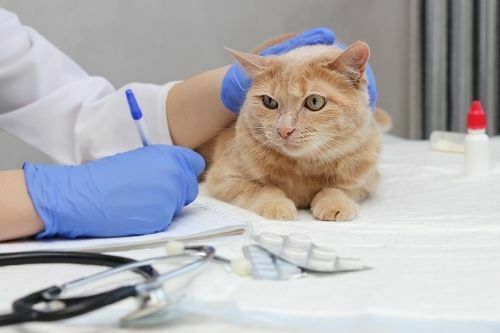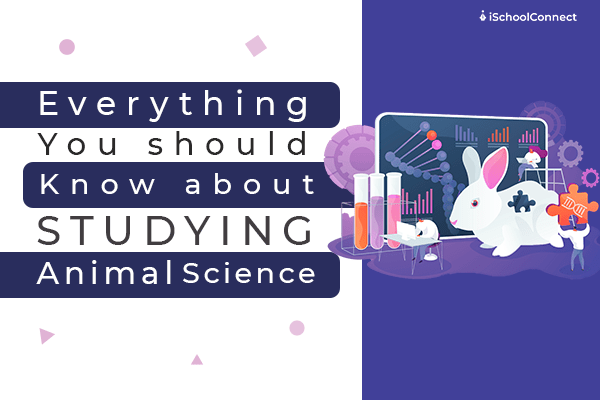Table of Contents
- What are an animal scientist’s responsibilities?
- What are the types of animal science programs I can consider?
- What are the skills I will learn in an animal science program?
- What are the different subjects covered in an animal science program?
- Which are the top universities in the world for an animal science program?
- What are the different career opportunities I can consider with an animal science qualification?
- Key Takeaways
- FAQs
Animal science is the study of animals that co-exist with humans. All around the globe, there is a reliance on animals for different purposes. The United States animal industry achieves a combined annual revenue of approximately USD 185 billion every year!
Understanding the requirements of different animals and their relationship with humans can help you create excellent interventions. These activities are primarily conducted to boost the health, well-being, and productivity of both humans & animals. Studying animal science is one of the best ways to gain the relevant knowledge and skills needed for a career in this field.
Keep reading to discover everything you need to know about this line of specialization!
What are an animal scientist’s responsibilities?
The field of animal science can be divided into four key areas of specialization:
- Production
- Regulation
- Research
- Education
As a part of the program, you will be exposed to the knowledge and skills needed for each of the above sectors. This can help you accurately determine the line of specialization most aligned with your skillsets.
Here are the key responsibilities of an animal scientist for each type of vocation:
- Production
- Production animal scientists will be responsible for herd management when working in animal production operations.
- These professionals will also be required to create scientifically and ethically proven methods to maximize yields, such as milk and eggs.
- Regulation
- These professionals work with regulatory agencies and are required to inspect farm production feedlots, dairies, and facilities.
- As a regulatory animal scientist, you will have to ensure that the production facilities operate according to humane treatment laws and health codes.
- Research
- These scientists are primarily responsible for designing ethical research studies that involve animal subjects.
- A key aspect of this vocation is being able to provide basic, humane care for the animal subjects.
- As a research animal scientist, you will also be responsible for collecting data, analyzing results, and publishing your findings. The latter is done with peer-reviewed corporate reports and trade journals.
- Education
- Animal scientists in the academic vocation are required to teach undergraduate and postgraduate courses.
- They also supervise student lab work while simultaneously conducting and publishing personal research.
What are the types of animal science programs I can consider?

There are several different types of animal science programs available around the world. You can opt for a program that is most aligned with your professional requirements and career goals.
Some of the most popular types of programs available include:
- Certification Courses
Duration – 3-6 months.
- Diploma Courses
Duration – 1 to 2 years.
- Undergraduate Courses
Duration – 3 -4 years.
- Postgraduate Courses
Duration – 2 years.
- Doctorate Courses
Duration – 2 years.
What are the skills I will learn in an animal science program?
As a part of the animal science program of any type that you pursue, some of the key skills you will develop include:
- Communication Skills
You will learn how to communicate and collaborate with different team members to share research findings in courses, publications, and reports.
- Time-Management
As an animal scientist, you will learn how to adhere to stringent schedules and meet deadlines on time for your organization.
- Scientific Methodologies
As a part of this course, you will be trained in the scientific know-how of working with and studying animals & animal processes.
What are the different subjects covered in an animal science program?

There are a vast number of subjects in animal science programs. Some of the key topics studied include:
- Veterinary Medication
- Agribusiness
- Immunology in Animal Well-Being
- Animals in Biomedical Examination
- Animal Nutrition
- Animal Husbandry
- Diseases & Animal Welfare
- Current Issues in the Industry
- Wildlife Conservation
- Legislation in the Animal Industry
- Introduction to Business Practices
- Data Science to Manage Animal Practices
Which are the top universities in the world for an animal science program?
Several universities around the world offer integrated plant & animal science programs. There are different types of programs available and you can opt for an option that is most suitable for your requirement and career objectives.
Some of the best universities for animal science training include:
- Cornell University (United States)
- Wageningen University & Research Center (Netherlands)
- University of Western Australia (Australia)
- Ghent University (Belgium)
- Michigan State University (United States)
- University of Copenhagen (Denmark)
- University of Cambridge (United Kingdom)
- Swedish Univerity of Agricultural Sciences (Sweden)
- University of Oxford (United Kingdom)
What are the different career opportunities I can consider with an animal science qualification?
Once you have received an animal science degree, there are several lucrative career opportunities that you can consider.
These include:
- Junior Research Scientist
These professionals run different types of experiments to explore the field of animal and veterinary science. This includes drawing outcomes based on scientific methods and publication of results.
- Animal Nutritionist
An animal nutritionist works to provide actionable direction about the dietary needs and wellbeing of animals. These are specialists who improve the quality of domestic animal lives, development, and animal nourishment.
- Veterinarian
A veterinarian works with animals by drawing a comprehensive picture of their state of health and wellbeing. These professionals largely work in private centers or government clinics.
If you are looking to pursue an animal science program of your choice, discover the best universities to apply to at www.ischoolconnect.com! The concise and clear information available on colleges and programs abroad will ensure you make a choice suited to your requirements!
Key Takeaways
- Animal science is an industry that contributes to developments in human life.
- Animal scientists are professionals who work to understand the symbiotic relationship between animals and man.
- Understanding every aspect of animal well-fare and well-being can help create processes that are smooth, systematic, and productive.
- There is a wide range of specializations that you can opt for within the realm of animal science.
- Pursuing the type of program that is aligned with your requirements can help you make the most of your qualifications.
FAQs
Q1. Will I learn about breeding & genetics as a part of an animal science program?
Answer – Yes, breeding & genetics is a crucial part of the syllabus in the study of animal science.
Q2. What is the job outlook for animal scientists?
Answer – According to research by the United States Bureau of Labor Statistics, the job outlook for agricultural and animal scientists will grow by 13% between 2016-2026!
Q3. Can I pursue a career in microbiology with a degree in animal science?
Answer – Yes! Microbiology is an excellent specialization you can segue into with a degree in animal science.






